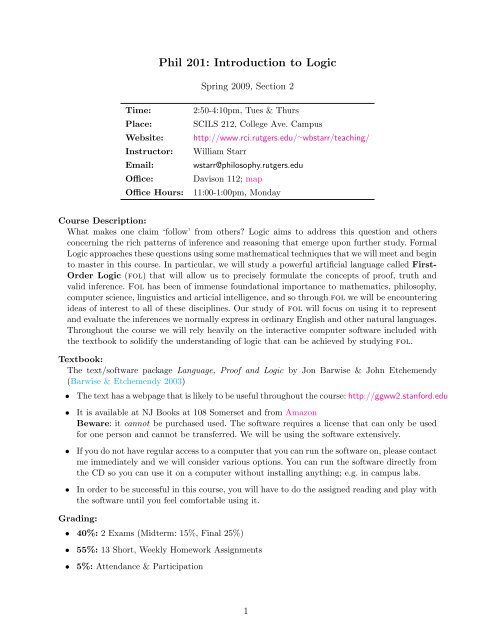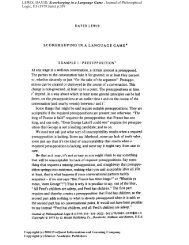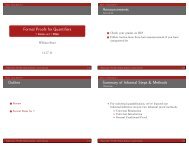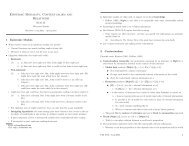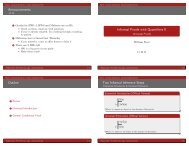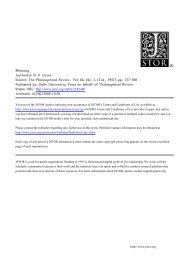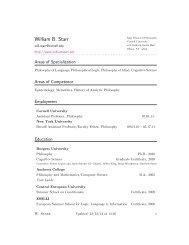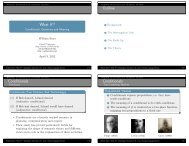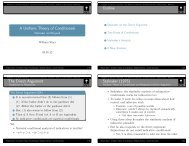Phil 201: Introduction to Logic - Will Starr
Phil 201: Introduction to Logic - Will Starr
Phil 201: Introduction to Logic - Will Starr
Create successful ePaper yourself
Turn your PDF publications into a flip-book with our unique Google optimized e-Paper software.
<strong>Phil</strong> <strong>201</strong>: <strong>Introduction</strong> <strong>to</strong> <strong>Logic</strong><br />
Spring 2009, Section 2<br />
Time:<br />
Place:<br />
Website:<br />
Instruc<strong>to</strong>r:<br />
Email:<br />
Office:<br />
Office Hours:<br />
2:50-4:10pm, Tues & Thurs<br />
SCILS 212, College Ave. Campus<br />
http://www.rci.rutgers.edu/ ∼ wbstarr/teaching/<br />
<strong>Will</strong>iam <strong>Starr</strong><br />
wstarr@philosophy.rutgers.edu<br />
Davison 112; map<br />
11:00-1:00pm, Monday<br />
Course Description:<br />
What makes one claim ‘follow’ from others? <strong>Logic</strong> aims <strong>to</strong> address this question and others<br />
concerning the rich patterns of inference and reasoning that emerge upon further study. Formal<br />
<strong>Logic</strong> approaches these questions using some mathematical techniques that we will meet and begin<br />
<strong>to</strong> master in this course. In particular, we will study a powerful artificial language called First-<br />
Order <strong>Logic</strong> (fol) that will allow us <strong>to</strong> precisely formulate the concepts of proof, truth and<br />
valid inference. Fol has been of immense foundational importance <strong>to</strong> mathematics, philosophy,<br />
computer science, linguistics and articial intelligence, and so through fol we will be encountering<br />
ideas of interest <strong>to</strong> all of these disciplines. Our study of fol will focus on using it <strong>to</strong> represent<br />
and evaluate the inferences we normally express in ordinary English and other natural languages.<br />
Throughout the course we will rely heavily on the interactive computer software included with<br />
the textbook <strong>to</strong> solidify the understanding of logic that can be achieved by studying fol.<br />
Textbook:<br />
The text/software package Language, Proof and <strong>Logic</strong> by Jon Barwise & John Etchemendy<br />
(Barwise & Etchemendy 2003)<br />
• The text has a webpage that is likely <strong>to</strong> be useful throughout the course: http://ggww2.stanford.edu<br />
• It is available at NJ Books at 108 Somerset and from Amazon<br />
Beware: it cannot be purchased used. The software requires a license that can only be used<br />
for one person and cannot be transferred. We will be using the software extensively.<br />
• If you do not have regular access <strong>to</strong> a computer that you can run the software on, please contact<br />
me immediately and we will consider various options. You can run the software directly from<br />
the CD so you can use it on a computer without installing anything; e.g. in campus labs.<br />
• In order <strong>to</strong> be successful in this course, you will have <strong>to</strong> do the assigned reading and play with<br />
the software until you feel comfortable using it.<br />
Grading:<br />
• 40%: 2 Exams (Midterm: 15%, Final 25%)<br />
• 55%: 13 Short, Weekly Homework Assignments<br />
• 5%: Attendance & Participation<br />
1
◦ We will do in-class group exercises. I will randomly call on students <strong>to</strong> present their<br />
group’s solution. If you aren’t here when I call your name, you loose participation points.<br />
To excuse such an absence, you are required <strong>to</strong> get a Dean’s note, as per the universitywide<br />
policy.<br />
Schedule<br />
Date Homework Exercises Reading Topics<br />
Week 1<br />
<strong>Introduction</strong><br />
01.20 None <strong>Introduction</strong><br />
01.22 1.1-1.4 A<strong>to</strong>mic Sentences & Tarski’s World<br />
Week 2<br />
The Concepts of <strong>Logic</strong><br />
01.27 HW1 Due 2.1,2.2 <strong>Logic</strong>al Consequence, Proof<br />
01.29 2.3-2.5 Proof, Fitch<br />
Week 3<br />
Boolean <strong>Logic</strong><br />
02.03 HW2 Due 3.1-3.7 Meet the Booleans: ∧, ∨, ¬<br />
02.05 4.1 Tau<strong>to</strong>logies, <strong>Logic</strong>al Truths<br />
Week 4<br />
Boolean <strong>Logic</strong> & Proofs<br />
02.10 HW3 Due 4.2-4.4 Consequence & Equivalence<br />
02.12 5.1-5.2 Informal Boolean Proofs<br />
Week 5<br />
Boolean Proofs<br />
02.17 HW4 Due 5.3-5.4 Indirect Proof<br />
02.19 6.1,6.2 Conjunction, Disjunction<br />
Week 6<br />
More Proofs & Conditionals<br />
02.24 HW5 Due 6.3-6.5 Negation, Subproofs<br />
02.26 7.1-7.3,7.5 Conditionals<br />
Week 7<br />
<strong>Logic</strong> of Conditionals<br />
03.03 HW6 Due 8.1,8.2,8.4 Conditional Proofs<br />
03.05 Review of Ch.’s 1-8<br />
Week 8<br />
Midterm, Quantification<br />
03.10 HW7 Due Midterm<br />
03.12 9.1-9.3 Basics of Quantification<br />
Week 9<br />
Spring Break!<br />
03.17 No Class<br />
03.19 No Class<br />
Week 10<br />
Intro <strong>to</strong> Quantification<br />
03.24 9.3,9.4 Basics of Quantification<br />
03.26 9.5,9.6 Translation<br />
2
Date Homework Exercises Reading Topics<br />
Week 11<br />
<strong>Logic</strong> of Quantification<br />
03.31 HW8 Due 10.1-10.4 Taut, Cons, Equiv<br />
04.02 11.1-11.3 Multiple, Mixed Quant.’s<br />
Week 12<br />
Translation, Proofs<br />
04.07 HW9 Due 11.4,11.5,11.8 More Translation<br />
04.09 12.1,12.2 Steps, Existential Instantiation<br />
Week 13<br />
Quantifiers in Proofs<br />
04.14 HW10 Due 12.3 General Proofs<br />
04.16 12.4 Mixed Proofs<br />
Week 14<br />
Formal Proofs<br />
04.21 HW11 Due 13.1 ∀ Rules<br />
04.23 13.2 ∃ Rules<br />
Week 15<br />
Formal Proofs, Review<br />
04.28 13.3 Strategy & Tactics<br />
04.30 HW12 Due 13.5 Review<br />
Week 16<br />
05.05 No Class No Class No Class, Reading Day<br />
05.07 No Class No Class No Class, Reading Day<br />
Week 17<br />
Final Exam<br />
05.13 Take-home Due Final Exam; 8-11am<br />
Homework<br />
Homework assignments are given out on Tuesdays and due by the beginning of class on<br />
the following Tuesday. Many exercises will be submitted electronically. This means that you<br />
must submit these exercises before class. Each assignment is worth 100 points and consists of 5<br />
problems, each worth 20 points. Partial credit is given. A list of the assignments and a rough<br />
break down of the grading scale is given below.<br />
Homework Assignments<br />
HW1 : 1.1, 1.2, 1.3, 1.4 HW2 : 2.1, 2.2, 2.6, 2.8, 2.20<br />
HW3 : 3.6, 3.9, 3.23, 4.2, 4.7 HW4 : 4.22, 4.23, 5.5, 5.8, 5.10<br />
HW5 : 5.17, 5.20, 6.1, 6.2, 6.6 HW6 : 6.7, 6.22, 6.26, 7.12, 7.13<br />
HW7 : 8.17, practice midterm HW8 : 9.5, 9.6, 9.9, 9.16, 9.17<br />
HW9 : 10.9, 10.14, 10.18, 11.8, 11.9 HW10 : 11.17, 11.24, 11.39, 12.4, 12.5<br />
HW11 : 12.8, 12.9, 12.11, 12.16, 12.23<br />
HW12 : Practice Final<br />
3
Homework Grading Scale<br />
• A: 100-95: 0-1 minor errors, 94-90: 1-2 minor errors<br />
• B+: 89-85: 3-4 minor errors<br />
• B: 84-80: 5-6 minor errors or 1 major error<br />
• C+: 79-75: 6-7 minor errors or 1 major & 1-2 major errors<br />
• C: 74-70: 8-9 minor errors or 1 major & 3-4 minor errors<br />
• D: 69-60: 10-11 minor errors or 2 major errors<br />
• F: 59-0: 12-13 minor errors or 3 major errors<br />
There is clearly a bit of art <strong>to</strong> classifying mistakes as major or minor, and even <strong>to</strong> counting mistakes<br />
for that matter. If you disagree with or are confused about the grade on your assignments,<br />
you are welcome <strong>to</strong> discuss them with me during office hours.<br />
As for late homework, here is the official policy.<br />
Late Homework Policy<br />
• With a dean’s note, you can turn in homework late without being penalized<br />
• 1-3 Days Late: 10 point penalty (i.e. one letter grade)<br />
• 4-6 Days Late: 20 point penalty (i.e. two letter grades)<br />
• And so on, with 10 points every 3 days<br />
Academic Integrity:<br />
In this course we will strictly adhere <strong>to</strong> the University Policy on Academic Integrity. If you<br />
are not familiar with it, view it at: http://academicintegrity.rutgers.edu/integrity.shtml Any<br />
violation of this policy will be reported immediately <strong>to</strong> the Office of Student<br />
Judicial Affairs. Violations will, at the very least, result in an F on the assignment in<br />
question, but are also likely <strong>to</strong> lead <strong>to</strong> an F in the class, suspension and other penalties.<br />
Exams<br />
If you miss an exam you will need a Dean’s note <strong>to</strong> make it up. This is just the university-wide<br />
policy.<br />
References<br />
Barwise, J. & Etchemendy, J. (2003). Language, Proof, and <strong>Logic</strong>. New edn., Stanford,<br />
California: CSLI Publications.<br />
URL http://www-csli.stanford.edu/LPL/<br />
4


